Duck & Cover (1951) was a 2004 addition to National Film Registry of movies that are "culturally, historically & aesthetically significant."
Part animation & mostly live-action, Burt the Turtle knows to hide in his shell when the monkey lights a giant firecracker that blows up the tree along with the the monkey. Burt in his shell is always safe.
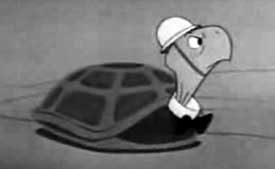 Duck & Cover is intented as totally instructional with a serious-sounding narrator telling us kiddies to take a lesson from Burt the Turtle, for we must all learn to "duck & cover" in case of nuclear war, so that we too will be perfectly safe. Duck & Cover is intented as totally instructional with a serious-sounding narrator telling us kiddies to take a lesson from Burt the Turtle, for we must all learn to "duck & cover" in case of nuclear war, so that we too will be perfectly safe.
An official Civil Deffence film shown in elementary schools during the 1950s, this was part of the government's attempt to assuage children's fears, assuring everyone that it was possible to survive the coming holocaust.
I'm just barely old enough to have been with the last year of first-graders who were taught to climb under our desks in case of nuclear war, & we had pretty regular test-runs for the holocaust. Far from soothing fears this contributed to the widespread cultural paranoia during the Cold War.
The absurdism of Duck & Cover & similar propagandistic instructional short subjects may seem comical for their naivete.
But one wonders if they weren't naive at all, that the real intent had always been to insure every child grew up sufficiently paranoid to support the government's crackpot cold war notion that there were commies hiding everywhere & that the best road to peace was war, whether in Korea or Viet Nam or the tiny island of Granada, it would forever be somewhere.
The one-reel nine-minute b/w film goes from the animation of Burt in his shell to instructions about all the dangers in a child's life -- fire, car crashes, & the atomic bomb. "You will know when it comes. It looks something like this." We see complete destruction of an animated landscape, whole buildings knocked down because we failed to learn what to do. All you gotta know is to "Duck & cover like Burt" then apparently the buildings won't be blown over.
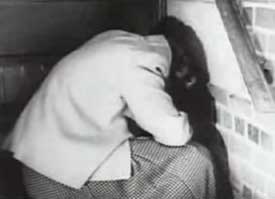 Or you could be burnt worse than the worst sunburn you ever had, unless you duck & cover. "Always remember! The flash of an atomic bomb can come at any time, no matter where you might be." Well, that's a relief! Or you could be burnt worse than the worst sunburn you ever had, unless you duck & cover. "Always remember! The flash of an atomic bomb can come at any time, no matter where you might be." Well, that's a relief!
This film is just a bundle of cheerful helpful information that'll see us through the holocaust, as once we've learned that even a picnic blanket or a newspaper can be a helpful shelter to save our lives, it'll all work out great. Just keep in mind such slogans as:
"Sometimes the bomb might explode without any warning. That means duck & cover fast."
"You might be eating your lunch when the flash comes. Duck & cover under the table."
"Getting ready means we will all have to take care of ourselves."
"It's a bomb! Duck & cover!"
"Patty covered herself with the coat she was carrying. She knew how to duck & cover."
"Here's Tony going to his cub scout meeting. Tony knows the bomb can explode any time of the year, day or night."
"We must obey."
"We must be ready every day all the time."
The companion Civil Defense propaganda piece Our Cities Must Fight (1951) is the "for adults" version of the kiddies' Duck & Cover from the same production crew.
It opens in a dimly lit newspaper office; uncredited director Anthony Rizzo seems to have wished he could've been a film noir director, but he had no film career after this. Placing the "story" among newspapermen created the phony illusion of listening in on the private conversations of the intelligentsia instead of government propaganda flacks.
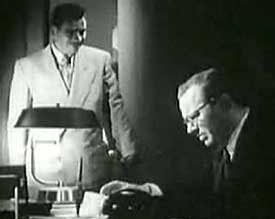 The editor has received a letter from a reader, which he calls "close to treason," though all it asserts is that when the atom bombs are falling on the cities, he intends to be living in the hills. The editor has received a letter from a reader, which he calls "close to treason," though all it asserts is that when the atom bombs are falling on the cities, he intends to be living in the hills.
As the editor converses with his friend, they thank god that not all American citizens think that way, planning instead to stay within the blast circle to do volunteer work for Civil Defense. Though most people know not to avoid the bombs, those who do plan to be far away from targets are "a serious problem."
The government propaganda varied over the years as to whether or not evacuations were possible, but in 1951 the hard-sell was that evacuation was first of all impossible & second of all more dangerous than staying put.
It's hard to imagine any real newspaper people speaking like these two guys. They represent the type of thinking that justified congressional investigations of "unamerican activities" for so many years, & which has taken up new meaning in our own era where the existence of terrorists instead of commies has justified the new-speak "Patriot" Act & other congressional go-aheads on circumventing the Constitution while weakening civil rights & doing away entirely with privacy rights. If you have nothing to hide, then you won't mind the government watching you even while you masturbate.
The fact that government wackjobs had to put this sort of thinking into the mouths of "free press" journalists instead of warmongering government appointees or representatives of the military complex indicates they knew how crazy they sounded even during those paranoic times. But if the intelligentsia say it, if objective reporters say it, then it's all true.
"We must make them realize there must be no taking to the hills!" says the faux-editor government mouthpiece. The film then cuts to all sorts of stock footage that symbolizes the imagined outcome of trying not to get A-bombed: traffic jams, London blitz, refugees in Europe. Anyone who uses the roads either afoot or in their care are traitors & deserters, hence the Civil Defense blockade to guarantee that citizens remain in the conflagration. The deadpan assertion here is that if refugees from the bombed cities of Europe hadn't gone in search of safer places, they wouldn't've been so bad off.
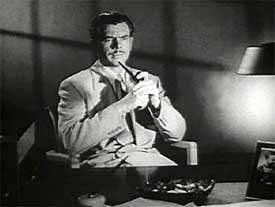 The irrationality of this film's ranting continues without concern for internal contradictions. There won't be many people left alive in the city therefore every remaining able body will be required to help the injured & dig out the buried bodies, so it's unamerican to try to avoid being bombed or to try to escape the burning rubble once called home. The irrationality of this film's ranting continues without concern for internal contradictions. There won't be many people left alive in the city therefore every remaining able body will be required to help the injured & dig out the buried bodies, so it's unamerican to try to avoid being bombed or to try to escape the burning rubble once called home.
After the cities are leveled by atomic bombs, "City dwellers find themselves right in the front lines. After an attack, our first responsibility will be to keep our heads & get back to our jobs."
The newspapermen conclude, "Staying in the city after a nuclear attack is not nearly as dangerous as people think. Lingering radiation is not really very serious. The danger of radiation & falling debris is over with in a minute & a half."
Civilians who do anything but what this film demands will be "guilty of desertion...it would not only be treasonable but it would mean you failed yourself, your family, your friends, your city."
Charges of treason are over the top, but from the government point of view, there were far too many citizens who could see right through the government's manipulations & predilection for lies.
There was a considerable public backlash of criticism against the Department of Civil Defense in the 1950s which manifested through a combination of deploring the bullshit factor, peacenik resistance to anything to do with nuclear warfare, & survivalist conviction that the right to bare arms would protect one's family better than these governmental morons pretending there could ever be sufficient shelters for everyone.
If the government convinces duped masses maltreat as traitors anyone who questions their government's policies, then the stigmatizing or even violent mob serve the status quo. And if intelligent peopl are reluctant to be pegged traitors & risk condemnation, they will be reluctant to speak out against folly & error, falling into line obediently.
The preposterous assumption throughout this film, & many like it from the era, is that a nuclear attack of an American city would be no worse than the conventional bombs dropped on London.
There's no embracing of what had recently happened to Nagasaki & Hiroshima with just two comparatively small atomic bombs: no bodies evaporated leaving only shadows of their having once existed, no survivors' skin sloughed from their bodies, none of the seemingly uninjured losing their hair & teeth, developing open soars, & dropping dead.
Rather, nuclear warfare will be as survivable as when Londoners came out of their safe hidey-holes to pick up the pieces. This kind of thinking would seem only a macabre relic of an ignorant past if the government didn't speak to us like this even now.
copyright © by Paghat the Ratgirl
|
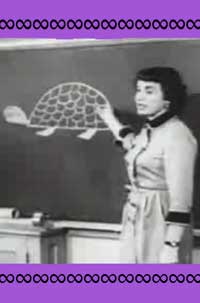
 Duck & Cover is intented as totally instructional with a serious-sounding narrator telling us kiddies to take a lesson from Burt the Turtle, for we must all learn to "duck & cover" in case of nuclear war, so that we too will be perfectly safe.
Duck & Cover is intented as totally instructional with a serious-sounding narrator telling us kiddies to take a lesson from Burt the Turtle, for we must all learn to "duck & cover" in case of nuclear war, so that we too will be perfectly safe. Or you could be burnt worse than the worst sunburn you ever had, unless you duck & cover. "Always remember! The flash of an atomic bomb can come at any time, no matter where you might be." Well, that's a relief!
Or you could be burnt worse than the worst sunburn you ever had, unless you duck & cover. "Always remember! The flash of an atomic bomb can come at any time, no matter where you might be." Well, that's a relief! The editor has received a letter from a reader, which he calls "close to treason," though all it asserts is that when the atom bombs are falling on the cities, he intends to be living in the hills.
The editor has received a letter from a reader, which he calls "close to treason," though all it asserts is that when the atom bombs are falling on the cities, he intends to be living in the hills. The irrationality of this film's ranting continues without concern for internal contradictions. There won't be many people left alive in the city therefore every remaining able body will be required to help the injured & dig out the buried bodies, so it's unamerican to try to avoid being bombed or to try to escape the burning rubble once called home.
The irrationality of this film's ranting continues without concern for internal contradictions. There won't be many people left alive in the city therefore every remaining able body will be required to help the injured & dig out the buried bodies, so it's unamerican to try to avoid being bombed or to try to escape the burning rubble once called home.